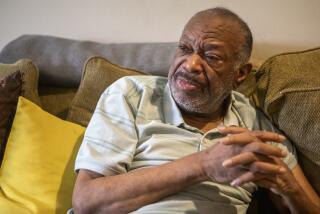A. Leon Higginbotham Jr.; Influential Black Judge
- Share via
BOSTON — A. Leon Higginbotham Jr., a civil rights defender who was one of the country’s most prominent and influential African American judges, has died. He was 70.
Higginbotham, of Newton, Mass., died Monday in a Boston hospital after a series of strokes last weekend.
For the record:
12:00 a.m. Dec. 17, 1998 For the Record
Los Angeles Times Thursday December 17, 1998 Home Edition Metro Part B Page 6 Metro Desk 2 inches; 44 words Type of Material: Correction
Higginbotham obituary--Because of erroneous information supplied by the Associated Press, The Times’ Wednesday obituary of former federal appeals court Judge A. Leon Higginbotham Jr. incorrectly reported that he was appointed to the Kerner Commission in 1968. Higginbotham was not a member of that commission.
Just two weeks ago, Higginbotham traveled to Washington to urge the House Judiciary Committee not to impeach President Clinton over the Monica Lewinsky matter.
Throughout his life, as a lawyer, judge and scholar, Higginbotham was known as a passionate advocate of civil rights. He received the nation’s highest civilian honor, the Presidential Medal of Freedom, in 1995.
When he retired in 1993, Higginbotham was chief judge of the 3rd U.S. Circuit Court of Appeals in Philadelphia, one of 13 federal appeals courts that are second in rank only to the U.S. Supreme Court. He was only the third black person to have directed any of the country’s circuit courts.
He also served as mediator and advocate when civil rights issues emerged around the world. In 1995, he was a member of the panel appointed by the American Assn. of University Professors to investigate the UC Board of Regents’ decision to end race-based affirmative action.
In 1994, Higginbotham served with former Secretary of State Henry A. Kissinger as mediator when state’s rights demands by Natal province threatened to delay the free elections that ended apartheid in South Africa.
Earlier, he headed an American Bar Assn. Working Group on the Unmet Legal Needs of Children, prompted by claims of racial and ethnic bias in courts after the 1992 Los Angeles riots. He had also worked on the Kerner Commission to analyze the causes behind riots in Los Angeles and several other cities during the 1960s.
The judge and law professor never hesitated to speak out on national controversies involving individual officeholders. In an unusual 1992 letter, he bluntly reminded Supreme Court Justice Clarence Thomas that he owed a considerable debt to the civil rights movement and implored him to work harder for the rights of women, minorities and the poor.
Higginbotham was first appointed to the federal bench in 1964. In 1977, President Jimmy Carter elevated him to the 3rd Circuit, which handles cases from Pennsylvania, New Jersey, Delaware and the Virgin Islands.
After retiring from the bench, Higginbotham became a public service professor of jurisprudence at Harvard’s John F. Kennedy School of Government.
Along with his judicial achievements, Higginbotham is acclaimed for his multivolume study, “Race and the American Legal Process.”
Born in Trenton, N.J., he earned degrees from Antioch College and Yale Law School, and later became Yale’s first black trustee.
He was also the first African American to serve on the Federal Trade Commission.
Higginbotham is survived by his wife, Evelyn Brooks Higginbotham, a professor of history and African American studies at Harvard, and four children.
More to Read
Sign up for Essential California
The most important California stories and recommendations in your inbox every morning.
You may occasionally receive promotional content from the Los Angeles Times.













